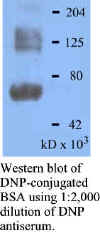Tissues are continually exposed to reactive oxygen species (ROS)
that are produced in tissues from metabolism processes or the
inflammatory response of leukocytes or macrophages. It is estimated that as much as 1% of consumed oxygen may be
converted to ROS, which can cause damage to various cellular components.
Proteins are one of the cellular components most vulnerable to
oxidative damage by ROS, which results in an increase in protein
carbonyl content. This
oxidative modification of proteins can lead to cross-linking, peptide
fragmentation, modified residues and the conversion of one amino group
to another. If sufficient
protein damage accumulates, cell death will occur.
Oxidative damage to proteins has been shown to result in an
increased protein turnover and decreased enzymatic activity and has been
associated with a number of disease states including emphysema,
arteriosclerosis and neurological disease.
Oxidized proteins appear to accumulate with age and may represent
30-50% of the total proteins in aged cells.
In Alzheimer’s disease, oxidative damage has been shown to
occur at the site of neurodegeneration.
Measurement of these carbonyl groups on proteins is a good
indication of the extent of oxidative damage to proteins.
Dinitrophenylhydrazine (DNPH) will react with free carbonyl
groups on proteins leading to adduction of the dinitrophenyl (DNP)
group to the carbonyl group. Using an antibody to DNP, it is possible to visualize and
localize the sites of oxidative damage by immunodetection of DNP
adduction resulting from reaction of the tissue with DNPH.
A goat antiserum to dinitrophenol is currently available.
This antiserum has been shown to be immunoreactive with DNP-modified bovine serum albumin
by ELISA as well as by western blot. This antibody should be a valuable
tool for scientists working to understand the role of carbonyl-modified
proteins in Alzheimer’s disease, in addition to both normal and
diseased states.
been shown to be immunoreactive with DNP-modified bovine serum albumin
by ELISA as well as by western blot. This antibody should be a valuable
tool for scientists working to understand the role of carbonyl-modified
proteins in Alzheimer’s disease, in addition to both normal and
diseased states.
Manufacturing
Reference:
Southwest
Immunology, Inc., unpublished results.